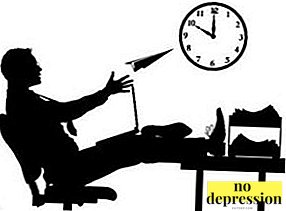Having criticism to yourself is a positive quality that has been taught since childhood. But sometimes it's too much, people start punishing themselves for the slightest nonsense. Such self-flagellation plunges a person into a permanent depression, guilt, reprimand. It may be a manifestation of an inferiority complex arising on the background of a defect in appearance or personality traits, status in society. Such thinking does not allow normal development, to achieve goals, so it makes sense to get rid of it.
What is self-flagellation?
Self-reproach is increased self-criticism, which is expressed in the accusation, repentance, condemnation of both their actions and the person in particular. Sometimes attributed to someone else's fault or a quick agreement on the suspicions of others. In society, also called "samodes".
Idealistic perception of the world of people leads to a state of despair. Since it is compared with itself, and the slightest disagreement with high standards is terrifying, it leads to devaluation of itself. Failure to consider the positive side causes irritation.
Hypertrophied criticism is often paraded. To around believe that a person repent of their deeds, wants to improve. So get support, forgiveness, praise. From what floats, that inside there are no such loud words, tears. Therefore, it is often just a manipulation.
Causes of self-flagellation
Factors that influenced the appearance of self-blame:
- Genetic addiction. If the parents, or one of them, are inclined to criticize themselves strongly, then there is a high probability that this trait will pass to the child.
- Upbringing. Mom and Dad constantly punished children, blamed them. When they were guilty of something, they said not only that it was impossible to do that. And they added that the child is bad. Since this is an early age, all criticism is accepted unconsciously.
- Low self-esteem. It may be due to the above factors, external defects, lack of achievements, negative statements from others.
- Pessimistic view of the world.
- Desire to disclaim responsibility. Manifested in infantile people who do not want to be responsible for their lives.
For the theory of Eric Bern in each personality there are 3 components of the Ego:
- child (through this component dreams, fantasies, desires are expressed);
- parent (responsible for self-discipline, self-criticism);
- adult (the embodiment of an objective point of view on the world).
Normally, they should be harmoniously combined. If the parent aspect is much larger, then the person will be overly self-critical. You can take a test on the leading subpersonality.
Main features
Those who are prone to samoedism are always in dissatisfaction with themselves, with the current situation, with life in general. Feels helpless, that even more oppressive, underestimates self-esteem. Such a state makes it difficult to find a way out, get rid of constant negative emotions.
I noticed my wrongdoing and promises myself that this will never happen again. Then, by chance, he again finds himself in a similar situation, punishes himself, reproaches himself for what he has done. Like bad words, it can commit physical violence - beat, for example. Or invent punishments.
Since such obsession with emotions turns off rational thinking, it is difficult to look at yourself from the outside. It seems as if you are moving in the right direction of self-improvement. Although, in fact, on the contrary you move away.
It is often impossible to withstand constant remorse of conscience, and in order to calm her down, they resort to alcoholism and drug addiction. But given the specificity of the individual, she will simply begin to reproach herself for the introduction of harm to health. Sometimes such a negative obsession can result in psychosomatic diseases.
Types of self-flagellation
The classification is based on the degree, the manifestation of criticism to yourself:
- Soft. The demonstrative version of the punishment. People actively criticize themselves in order to absolve themselves of guilt. By type: "See how I suffer. I am very sorry!". Although actually inside calmly.
- Tough. Self-flagellation is already manifesting itself destructively. Not shown in public, directed inward. Really considers himself guilty, criticizes, punishes.
- Neurotic. It crosses the permissible limits, becomes an obsessive form of obsessive-compulsive disorder. Samoedstvo for any reason, even the most insignificant. For example, a spoon fell from the hands. This may drag on a whole tirade of carelessness, embarrassment, that this will pass all life, no goals will be achieved.
What is an inferiority complex
An inferiority complex is a feeling that it’s much worse for everyone around, nothing will ever be achieved. Always in constant stress, anxiety. Other people's comments are taken very close to the heart.
Formed on the basis of a defect in appearance: real or contrived. Due to specific qualities or living conditions (for example, low wages). Low self-esteem, as a rule, is always characteristic. It is she who does not give an opportunity to change something in her life.
The complex of independence can be manifested by oppression, a constant feeling of anxiety. A depressive disorder may develop. Self-flagellation is another possible manifestation.
How to get rid of Samoyed
In order to change the quality of your life, you should self-develop: corrected character traits, worldview:
- Accept yourself the way you are. This does not mean that you should not change anything if you are not very happy with it. But do not set a high, inaccessible ideal. Thus, there will remain qualities that can be calm over time, eliminated, improved. But the current state of affairs will not be annoying.
- Do not compare with others. Even if someone seems to be successful in everything, beautiful, this does not mean that he has no flaws. He just hides them well. Therefore, do not be upset that someone is better. After all, all are beautiful in their individuality.
- Make a habit of comforting yourself. Instead of blaming, you can try to say that not everything is so bad. What in some dubious situation were not to blame. But it needs to be controlled in order not to become a person who takes everything off his hands.
- Be here now. Concentrating attention on the actions that have already passed, does not allow us to live in the present moment. You need to return yourself from negative thinking to the real world.
- Act. Instead of sitting up, blaming yourself, you should start to actively rectify the situation: apologize, deal with someone in the cause.
Self-blame eats a person, his life is filled with exclusively negative emotions and guilt, for which he must be punished. But this position is not always true, worth punishment. Therefore, the sooner you start changing something in your head, psyche, the faster will be the results, the feeling of lightness.



